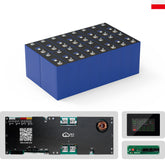advantages of using lithium batteries in forklifts
In the modern materials handling industry, companies are increasingly looking for the advantages of using lithium batteries in forklifts to improve productivity, reduce downtime, and enhance operational efficiency. Understanding these advantages is critical for warehouse managers, logistics professionals, and fleet owners who want to stay competitive while reducing operational costs. This guide will walk you through the key advantages of adopting lithium battery technology in your forklift fleet, exploring everything from cost savings and maintenance benefits to safety improvements and sustainability considerations.
- Understanding the Core advantages of Using Lithium Batteries in Forklifts
- Operational advantages of Using Lithium Batteries in Forklifts
- Financial advantages of Using Lithium Batteries in Forklifts
- Maintenance advantages of Using Lithium Batteries in Forklifts
- Safety advantages of Using Lithium Batteries in Forklifts
- Productivity advantages of Using Lithium Batteries in Forklifts
- Environmental advantages of Using Lithium Batteries in Forklifts
- Operational Case Study advantages of Using Lithium Batteries in Forklifts
- Strategic Planning advantages of Using Lithium Batteries in Forklifts
- Comparing the advantages of Lithium vs Lead Acid Batteries in Forklifts
- How to Evaluate the advantages of Using Lithium Batteries in Your Fleet
- Final Thoughts on the advantages of Using Lithium Batteries in Forklifts
Understanding the Core advantages of Using Lithium Batteries in Forklifts
What Makes Lithium Batteries Different
One of the most significant advantages of lithium batteries in forklifts is their advanced chemistry compared to traditional lead-acid batteries. Lithium-ion technology provides higher energy density, faster charging, longer cycle life, and lower maintenance requirements.
Lithium batteries use advanced materials like lithium iron phosphate (LiFePO4) to store and release energy more efficiently. This difference alone offers key advantages in industrial settings where uptime is critical.
Energy Density and Weight advantages
Lithium batteries are far lighter and more compact than lead-acid alternatives. This weight reduction translates to less wear and tear on forklift components, better maneuverability, and higher lifting capacity. The improved energy density also means more work can be accomplished on a single charge—one of the biggest advantages for busy warehouses.
Operational advantages of Using Lithium Batteries in Forklifts
Faster Charging Times
Traditional lead-acid batteries often require 8 hours or more to charge and another 8 hours to cool down. Lithium batteries can achieve full charge in 1–2 hours, with opportunity charging capabilities allowing them to be topped off during short breaks. This is a major operational advantage for 24/7 warehouses and multi-shift operations.
Opportunity Charging
Opportunity charging is one of the defining advantages of lithium technology. Workers can charge batteries during breaks, lunches, or shift changes without harming battery life. This flexibility eliminates the need for battery swapping or spare batteries, reducing labor costs and downtime.
Eliminating Battery Swaps
Lead-acid systems often require costly battery swap stations and extra batteries to maintain multi-shift operation. Lithium batteries last longer per charge and support opportunity charging, eliminating the swap infrastructure entirely. This is a huge space and cost advantage.
>>See also how many solar panels do you need to generate 15kwh daily
Financial advantages of Using Lithium Batteries in Forklifts
Lower Total Cost of Ownership
Although lithium batteries have a higher upfront price, they deliver a significantly lower total cost of ownership over their lifespan. With up to four times the cycle life of lead-acid batteries and reduced maintenance requirements, they pay for themselves through:
Lower labor costs
Fewer replacements
Reduced downtime
Energy savings
These financial advantages are particularly compelling for large fleets with high utilization rates.
Reduced Infrastructure Costs
Eliminating the need for charging rooms, battery swap stations, ventilation systems (to remove hydrogen gas from lead-acid charging), and additional safety features means companies can reallocate space and resources. This infrastructural advantage adds up to major cost savings.
Energy Efficiency
Lithium batteries are more energy-efficient during both charging and discharge cycles. They typically waste less energy as heat, making them an environmentally and financially sound choice. Over time, these energy advantages translate into measurable utility bill savings.
Maintenance advantages of Using Lithium Batteries in Forklifts
No Watering Required
Lead-acid batteries demand regular watering to maintain electrolyte levels and avoid damaging plates. Lithium batteries are sealed and maintenance-free. This saves labor costs and avoids mistakes that can reduce battery life.
Reduced Downtime
Because lithium batteries don’t need scheduled watering, equalizing charges, or cleaning of acid spills, forklifts spend more time on the floor moving products and less time out of service. This maintenance advantage is particularly valuable in fast-paced environments.
Longer Service Life
Lithium batteries can last 2,000–5,000 cycles or more, while lead-acid batteries typically last 1,000–1,500 cycles. This extended service life reduces replacement frequency and associated costs, making it a clear advantage for long-term planning.
Safety advantages of Using Lithium Batteries in Forklifts
Reduced Risk of Acid Spills
Lithium batteries are sealed units with no liquid electrolyte to spill or leak. This makes them cleaner and safer to use in food storage, pharmaceuticals, and other sensitive industries. The safety advantage here is not just operational but regulatory.
No Hazardous Gas Emissions
Lead-acid batteries emit hydrogen gas during charging, requiring special ventilation to avoid explosion risks. Lithium batteries do not emit dangerous gases, removing the need for expensive ventilation systems and improving worker safety.
Advanced Battery Management Systems
Most lithium batteries come with integrated Battery Management Systems (BMS) that monitor temperature, voltage, and current in real time. These systems prevent overcharging, overheating, and short circuits, adding another layer of safety advantage.
Productivity advantages of Using Lithium Batteries in Forklifts
Consistent Power Delivery
Lead-acid batteries tend to drop voltage as they discharge, reducing forklift performance over a shift. Lithium batteries deliver consistent voltage throughout the entire charge, maintaining lift capacity and travel speed. This consistent performance is a major advantage for productivity.
Extended Run Times
With higher energy density and better efficiency, lithium batteries can keep forklifts running longer per charge. For busy warehouses, this advantage can directly translate to higher throughput and customer satisfaction.
Simplified Charging Logistics
Because lithium batteries support rapid and opportunity charging, scheduling and logistics are simplified. There's no need to coordinate battery swaps or allocate manpower for changing batteries. This labor-saving advantage helps businesses operate leaner and more efficiently.
Environmental advantages of Using Lithium Batteries in Forklifts
Lower Carbon Footprint
Lithium batteries improve energy efficiency, reducing overall electricity consumption. Coupled with renewable energy sourcing, they help companies lower their carbon footprint—a critical advantage for sustainability goals.
No Acid Disposal Issues
Lead-acid batteries require specialized disposal due to their toxic contents. Lithium batteries eliminate this hazard, simplifying end-of-life management and reducing environmental liabilities.
Recyclability
Lithium batteries are increasingly recyclable. Many manufacturers offer take-back programs, allowing users to responsibly manage battery disposal and support a circular economy. This recyclability is an environmental advantage companies can proudly highlight.
Operational Case Study advantages of Using Lithium Batteries in Forklifts
Warehouse Example
A 3-shift distribution center switched its 50-forklift fleet from lead-acid to lithium-ion batteries. Key advantages achieved:
Eliminated 2-hour daily battery swap time
Saved $500,000 over 5 years in labor and maintenance
Repurposed the battery charging room for extra storage
Improved safety by removing hydrogen ventilation systems
Manufacturing Plant Example
A manufacturing site using forklifts in material supply chains upgraded to lithium batteries and saw these advantages:
30% reduction in electricity costs thanks to more efficient charging
Zero maintenance downtime for watering or cleaning
Increased operator satisfaction with consistent performance
>>See also how many 350 watt solar panels are needed to produce 15 kwh annually
Strategic Planning advantages of Using Lithium Batteries in Forklifts
Scalability
As business grows, lithium battery solutions scale more effectively. There’s no need to expand battery rooms or swap stations. This scalability advantage supports business expansion with minimal capital investment.
Data and Fleet Management
Many lithium batteries offer telematics integration for real-time monitoring. Managers gain visibility into usage patterns, charging cycles, and maintenance alerts. This data-driven advantage improves fleet optimization and cost control.
Comparing the advantages of Lithium vs Lead Acid Batteries in Forklifts
Cost Comparison Over Life Cycle
While lithium batteries can cost 2–3 times more upfront, their total life-cycle cost is lower when considering:
Reduced replacements
Lower maintenance
Energy efficiency
Labor savings
The cumulative advantages outweigh the initial investment.
Operational Performance Comparison
Lead-acid:
Requires watering
Slow charging
Voltage sag
Hazardous gases
Lithium:
Maintenance-free
Fast charging
Consistent power
Safer operation
Final Thoughts on the advantages of Using Lithium Batteries in Forklifts
Investing in lithium batteries delivers compelling advantages for forklift operations of all sizes. By reducing maintenance costs, improving safety, increasing productivity, and supporting sustainability, lithium technology is reshaping the materials handling industry. Companies that adopt these solutions gain a competitive edge, reduce long-term costs, and ensure their operations are safer and more efficient.
If you’re ready to explore these advantages for your fleet, contact a qualified supplier for a personalized ROI analysis. The advantages of using lithium batteries in forklifts are clear—and with the right plan, you can start realizing them today.
























Leave a comment
All blog comments are checked prior to publishing